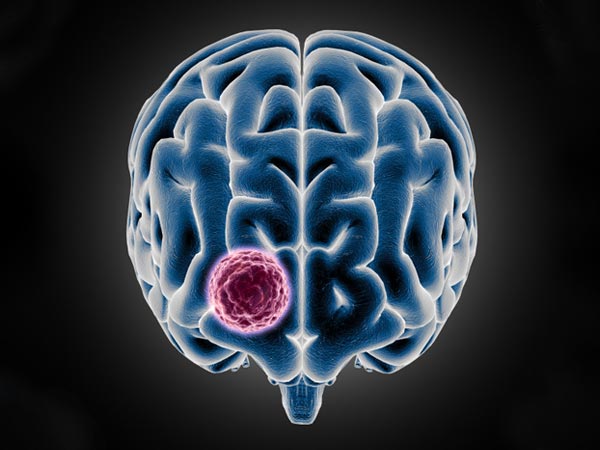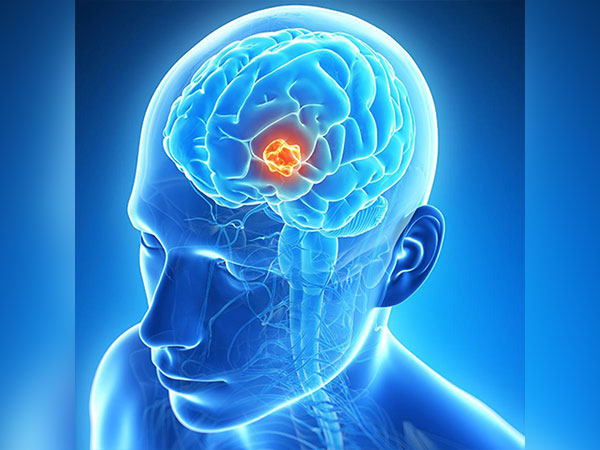
What Causes Brain Tumour?
The exact cause of brain tumour is not known. However, according to the American Cancer Society, brain tumours occur when there are changes (mutations) in the DNA of the cells. This allows the cells to grow and divide rapidly, resulting in the abnormal growth of cells, which forms a tumour [4].
In addition, genetic syndromes and exposure to high-dose ionising radiation lead to the risk of developing primary brain tumour [5].

Types Of Brain Tumour
Primary brain tumour
Primary brain tumour that begins in the brain can develop from your brain cells, nerve cells, the membranes that surround your brain (meninges) and glands.
Primary brain tumours can be benign or malignant. According to a study, malignant brain tumours are among the most difficult cancers to treat, having a five year survival rate not more than 35 per cent [6].
In adults, the most common types of brain tumours are gliomas [6] and meningiomas.
Other types of primary brain tumour include pituitary tumour, medulloblastoma [7], craniopharyngioma, ependymoma, pineal gland tumour, craniopharyngiomas, germ cell tumours, central nervous system (CNS) lymphomas, schwannomas, glioblastoma [8], oligodendroglioma [9] and pediatric brain tumours [10].
 What Are The Chances Of Surviving Glioblastoma?
What Are The Chances Of Surviving Glioblastoma?
Secondary brain tumour
Secondary brain tumour is a tumour that grows within the brain that has arisen from the spread of a cancerous tumour that started in another part of the body and spread in the bloodstream to the brain. These cancers include lung, breast, bowel, kidney, skin and other cancers.

Symptoms Of Brain Tumour
• New onset or change in the patterns of headaches
• Having headache in the morning
• Nausea and vomiting
• Headaches that become more frequent and severe
• Difficulty in balancing
• Vision problems
• Speech difficulties
• Hearing problems
• Changes in behaviour or mood
• Memory problems
• Seizures
READ RELATED: 2022 South African Soweto shooting 14 dead, 9 injured, What about the Suspect?
• Gradual loss of sensation or movement in the arm or leg
• Confusion in everyday matters

Diagnosis Of Brain Tumour
The doctor will conduct a number of tests to find out more about the tumour’s size, type and location. These tests include the following:
• Neurological exam – This test is done to figure out what is causing your symptoms. A neurological test includes hearing test, eye test, balance and coordination test, reflex test, sense of touch and smell test, facial muscle test, head movement test, tongue movement and gag reflex test, memory test, abstract thinking, and mental status tests.
If the doctor suspects that a brain tumour is causing your symptoms based on the neurological exam results. The doctor may order additional tests such as CT scan, MRI, blood and urine tests [12].

Treatment Of Brain Tumour
The treatment of brain tumour depends on the type, size, location, age and overall health.
Surgery
It is the first step in treating most brain tumours and it’s often the preferred treatment because it can help remove as much of the tumour as possible without damaging any of the healthy brain tissues surrounding the tumour.
Chemotherapy
This treatment procedure uses drugs to kill cancer cells and stops them from spreading or slowing their growth. Chemotherapy can help treat anaplastic astrocytoma, medulloblastoma or germ cell tumours. Primary cerebral lymphomas can only be cured by chemotherapy [13].
Radiation therapy
Radiation also called x-rays, gamma rays or photons work by killing the tumour cells directly or interfere with the growth of the tumour cells. An increasing number of tumour cells die due to radiation therapy. Radiation therapy may be used after surgery to destroy the remaining part of the tumour cells.
After treatment, rehabilitation is an important part of your recovery process. These include physical therapy, speech therapy and occupational therapy.
 Study Reveals A New Drug May Help Treat Brain Tumours
Study Reveals A New Drug May Help Treat Brain Tumours

Can Brain Tumour Be Prevented?
You can’t prevent a brain tumour, but you can lower your risk of developing a brain tumour by avoiding smoking and reducing the exposure to radiation.
Common FAQs
Q. Are all brain tumours deadly?
A. According to the National Foundation for Cancer Research, glioblastoma multiforme (GBM) is the deadliest type of brain cancer, which accounts for about 45 per cent of all malignant brain tumours.
Q. How long will you live if you have a brain tumour?
A. The life expectancy for malignant brain tumours usually have a five-year survival rate after diagnosis.
Q. How serious is a brain tumour?
A. Malignant brain tumours can cause brain damage and it can be life-threatening.
Source: boldsky blog










